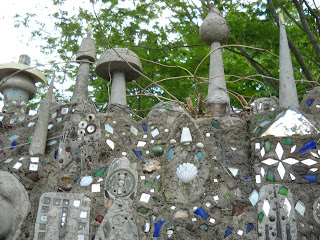We went to Finster Fest at Paradise Gardens in Summerville, Georgia over the weekend with a booth of Thunder-Sky, Inc. art. It was one of those experiences I'll never forget -- being in the epicenter of a universe I have been circling most of my life.
Art is often a way out for many people: making it, buying it, loving it... Art-making for Howard Finster was a way for him to find a sort of heaven on earth. He seems to have relished the idea of Slipshod Utopia, and that aesthetic is in full-bloom now, with all his sculptures and installations slowly (and some quickly) deteriorating. But it is a spiritual disintegration, isn't it? All that art and love and godliness left to the elements, being eaten up by rain and time. It seems almost like a prophecy, Biblical, humble and small. Finster's art has the same effect: his paintings and other works may come off to some as Bible-belt kitsch, when in reality he was doing what William Blake did, creating his own aesthetic and philosophy using organized religion only as a platform for something bigger, stranger, and kinder.
I felt as if I had drifted into somebody else's dream being there, but it was my dream too somehow. Finster has made sure of that. Concrete facades built from bear faces and pop bottles, old costume jewelry and broken dinnerware. There's that initial whimsy to it, of course, but that has worn off now, and what's left is the bare bones of belief and decency. Finster did not construct a Paradise that would last. I think that's part of his meaning: you can't get there from here. You can only find glimpses and create idols that crack and melt into grotesques.
The area around Paradise Gardens is residential, and many of the other homes are abandoned. There's a state prison in Paradise's backyard. Highway 27 toward Summerville is green and raw, a landscape of hollow trees and overgrown grass and static cows, old ranch-style houses and barns, and a sky above it all as blank as thoughts before you go to sleep. I kept thinking of a phrase Flannery O'Connor said of her version of Georgia -- that it was "Christ-haunted." That's the feeling. A holy ghost barely visible, being chased away.
Paradise Gardens is not paradise of course. Its poetic decay is incredibly moving, but also very sad. It makes you wonder if Finster had not been categorized in the way he was (as an "outsider/folk/self-taught/visionary artist"), maybe we would not be losing Paradise in this way. Finster made immense contributions to culture from this location. Respect needs to arrive soon in the form of conservation and curation. Here's the website if you're interested in providing any kind of support: Howard Finster's Paradise Gardens.
Below are photos we took... An incredible place...













What a beautiful post. I just love these words:
ReplyDelete"Concrete facades built from bear faces and pop bottles, old costume jewelry and broken dinnerware. There's that initial whimsy to it, of course, but that has worn off now, and what's left is the bare bones of belief and decency. Finster did not construct a Paradise that would last. I think that's part of his meaning: you can't get there from here. You can only find glimpses and create idols that crack and melt into grotesques."